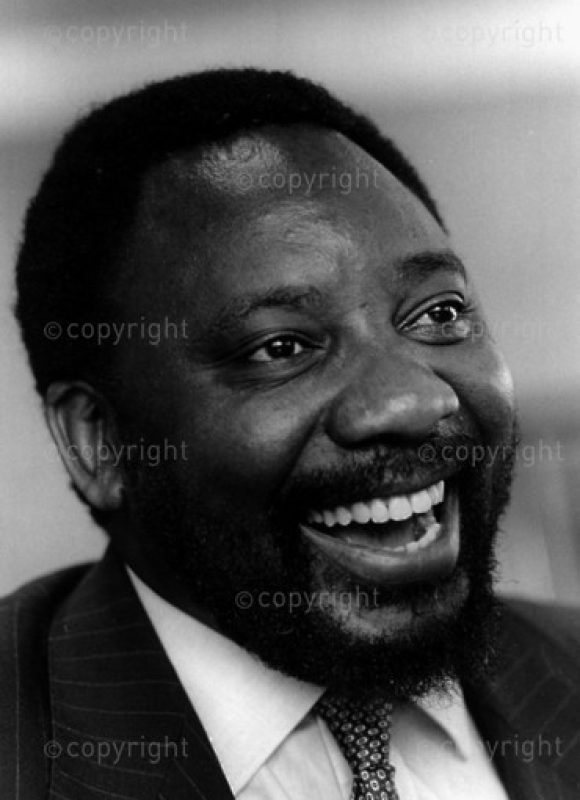PIONEER
Cyril Matamela Ramaphosa

Politician | Negotiator | Constitution drafter
Born: 17 November 1952
“This constitution, with its Bill of Rights, is the mirror of South African society. It reflects both the history from which we have emerged, and the values we now cherish – human dignity, equality and freedom. It proclaims to the world that we are a society committed to democracy, to the rule of law and the protection of human rights. It proclaims to all South Africans, the landless, the homeless, the women, the workers, and the children of this country, that their basic needs and aspirations matter enough to be included in the country’s constitution.”
Who is
Cyril Matamela Ramaphosa?
Current President of the Republic of South Africa who was a prominent anti-apartheid activist and trade unionist.
Professions
and Roles
General Secretary of the National Union of Mineworkers (NUM); Secretary-General of the African National Congress (ANC) in 1991; Chairperson of the Constitutional Assembly; Businessman; Deputy President of South Africa between 2012 and 2018; President of South Africa from 2018 to present.
Best Known For
Chairperson of the Constitutional Assembly that was responsible for drafting the democratic constitution; Being President of South Africa.
Life highlights
- Ramaphosa joined South African Students’ Organisation (SASO) and Black People’s Convention (BPC) at the University of the North where he studied his first law degree.
- He was detained for supporting pro-Frelimo rallies in 1974 and then again during the student uprising of 1976.
- Ramaphosa was the first General Secretary of NUM in 1982. Under Ramaphosa’s leadership, the membership of the NUM grew from 6 000 to 300 000.
- He helped establish COSATU in 1985.
- Ramaphosa was the Chairperson of the ‘Reception Committee’, a body set up to coordinate the release of and to receive the Rivonia trialists, most of whom were freed in October 1989. He then oversaw the release of Nelson Mandela in February 1990.
- Ramaphosa was elected ANC Secretary-General in 1991. He headed the ANC negotiating team with the National Party during CODESA and Multiparty Negotiating Forum.
- Ramaphosa was awarded the National Order of the Baobab in Silver in 2009 for his contribution to the multiparty negotiations and for chairing the Constitutional Assembly.
- He chaired the Constitutional Assembly which drafted the first democratic Constitution.
- Ramaphosa was the Deputy President of the country in 2012 and elected President of the country in 2018.
IN THEIR OWN WORDS
“The liberation on struggle was a struggle for human rights and the affirmation, recognition and protection of each South African’s human dignity. It was also about achieving equality for the masses of our people and ensuring the enjoyment of full civil, political and socio-economic rights.
The ‘Birth Certificate’ we acquired on 10 December 1996, following the adoption of our Constitution into law, gave all South Africans a new life that is based on a human rights culture that is second to none.”
– Cyril Ramaphosa
IN THE WORDS OF OTHERS
“You can’t say no. You’ve got to take this position and be Chairman of the Constitution-making body. There is no one else that I could have as Chairman of this important body.
Cyril Ramaphosa was elected secretary-general, evidence that the torch was being passed from an older generation of leadership to a younger one. Cyril, whom I met only upon my release from prison, was a worthy successor to a long line of notable ANC leaders. He was probably the most accomplished negotiator in the ranks of the ANC, a skill he honed as secretary-general of the National Union of Mine Workers.”
– Nelson Mandela, Former President of South Africa
“Cyril’s attributes of patience, perseverance, self-control, and an analytical mind, and his ability to unpack complex issues and distil the essence of the argument in clear and understandable terms, drew parties closer. He could achieve this because he could identify areas of broad agreement and constantly suggest alternatives to contested or contentious areas.”
– Enver Surty, Former ANC member of the Constitutional Assembly
“He was also a fine role model. Tough, optimistic, brilliant, he had set a fine example in building a productive relationship of trust with Roelf Meyer, head of the NP negotiating team, and other negotiators … I gained invaluable experience in negotiating and learned a huge amount from Cyril Ramaphosa, a master of the art of negotiation. And now we had, under Ramaphosa’s leadership, taken South Africa to the next stage. We had a constitutional democracy that was hailed and respected throughout the world and would take us forward into the new era.”
– Willie Hofmeyr, Former ANC member and MP
“I learnt immensely from Mr Ramaphosa in terms of his negotiation skills, his patience to listen to all the views of colleagues and the ability to discern where compromises could be struck from the often sharply opposing views of the representatives of the different political parties and constituents. We worked together during the talks at CODESA. One thing that stood out for me was his ability to inspire people to trust the process and to feel part of it without much fear or suspicion. He understood that when humans were faced with a common challenge, they tend to gravitate towards one another to make some concessions.”
– Mninwa Mahlangu, Former ANC member of the Constitutional Assembly
Parliament of the Republic of South Africa (2018) Theme Committee Book Series 1-6
